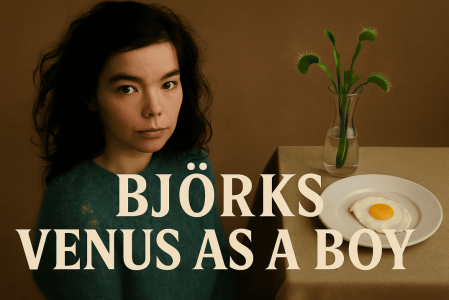In 1993, Björk released “Venus as a Boy” as part of her first solo album, Debut. It quickly became one of the standout tracks—an early glimpse into her distinct artistic voice. Coming off her time with The Sugarcubes, the song marked a bold step into new sonic territory, setting the tone for a solo career full of invention and emotional depth.
From The Sugarcubes to Sonic Exploration
Produced by Nellee Hooper, who had worked with Massive Attack and Soul II Soul, the track blended dance beats with global textures. Björk had already made waves as the magnetic lead of The Sugarcubes, but Debut was personal. She embraced sounds that felt more intimate and exploratory—house, jazz, ambient, and world music all fused under her unique direction.
The timing was right. The early ’90s were a turning point, with trip-hop emerging and pop becoming more experimental. “Venus as a Boy” didn’t just ride this wave—it helped shape it, introducing a new kind of emotional pop built on texture, vulnerability, and global influence.
A New Kind of Masculinity in Pop Lyrics
At its core, the song is about tenderness. Björk sings about a man who sees beauty everywhere, who is gentle and sensual in ways that were rarely celebrated in male figures within mainstream music. “He believes in beauty / He’s Venus as a boy,” she sings—recasting Venus, the goddess of love, into a male form.
Rather than romantic clichés or brash declarations, the lyrics offer quiet admiration. The line “He’s exploring the taste of her arousal” is intimate but respectful—centering emotional connection over physical conquest. The song is thought to be inspired by artist Dominic Thrupp, who Björk was involved with at the time. Whether personal or symbolic, it feels like a love letter to emotional intelligence and softness in men.
Sound That Mirrors Emotion
https://youtu.be/7Z5aPaDwAkU?si=KsD66A4-feou03Kg
Musically, the song is as tender as its lyrics. The tabla, played by Talvin Singh, provides a soft rhythmic pulse that feels almost like a heartbeat. Strings rise and fall gently in the background, giving the track a cinematic glow. These elements wrap around Björk’s voice, letting her words breathe and resonate.
The production blends electronic and traditional sounds in a way that reflects the song’s deeper message: duality, balance, and emotional openness. The arrangement is minimal but intentional—each element placed to support the mood without overwhelming it.
A Visual Shift in Pop Culture
The music video, directed by Sophie Muller, adds another layer to the song’s meaning. It’s a simple, surreal sequence of Björk in a kitchen, cooking eggs. But under Muller’s lens, the act becomes a sensual ritual. It’s nurturing, slow, and symbolic—domesticity turned into quiet poetry.
This kind of visual storytelling was rare in early ’90s pop, and it left a mark. Björk’s willingness to challenge both sonic and visual norms opened doors for future alt-pop artists. You can see echoes of her influence in artists like FKA twigs and Bat for Lashes—performers who use sound and imagery to question identity and emotion in similar ways.
Closing Thoughts
“Venus as a Boy” didn’t just change how Björk was seen—it nudged pop itself in a new direction. By centering a type of masculinity that valued feeling over force, beauty over bravado, it redefined who could be the subject of a love song. In a decade often dominated by macho energy, Björk’s take felt radical.
And that’s the song’s lasting power. It wasn’t loud or confrontational, but it didn’t need to be. It quietly redrew the lines of gender in pop music—and made room for softness, vulnerability, and complexity in places where they had rarely been welcome.
“Venus as a Boy” is more than a standout track from Björk’s debut—it’s a manifesto. It introduced the world to a different kind of pop music: genre-blurring, emotionally rich, and deeply human. And in doing so, it left a mark that still shapes the conversation around gender and artistry in music today.
